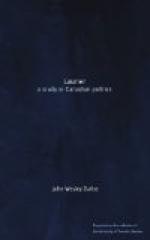After the lapse of so many years there is no need for lack of candor in discussing the events of 1885. To put it plainly Riel’s fate turned almost entirely upon political considerations. Which was the less dangerous course,—to reprieve him or let him hang? The issue was canvassed back and forth by the distracted ministry up to the day before that fixed for the execution when a decision was reached to let the law take its course. The feeling in Quebec in support of the commutation was so intense and overwhelming that it was accepted as a matter of course that Riel would be reprieved; and the news of the contrary decision was to them, as Professor Skelton says, “unbelievable.” The actual announcement of the hanging was a match to a powder magazine. That night there were mobs on the streets of Montreal and Sir John Macdonald was burned in effigy in Dominion square. On the following Sunday forty thousand people swarmed around the hustings on Champ de Mars and heard the government denounced in every conceivable term of verbal violence by speakers of every tinge of political belief. This outpouring of a common indignation with its obliteration of all the usual lines of demarcation was the result of the “wounding of the national self-esteem” by the flouting of the demand for leniency, as it was put by La Minerve. Mercier put it still more strongly when he declared that “the murder of Riel was a declaration of war upon French Canadian influence in Confederation.” A binding cement for this union of elements ordinarily at war was sought for in the creation of the “parti national” which a year later captured the provincial Conservative citadel at Quebec and turned it over to Honore Mercier. This violent racial movement raged unchecked in the provincial arena, but in the federal field it was held in leash by Laurier. That he saw the possibilities of the situation is not to be doubted. He took part in the demonstration on Champ de Mars and in his speech ’made a declaration—“Had I been born on the banks of the Saskatchewan I myself would have shouldered a musket”—which riveted nation-wide attention upon him. Laurier followed this by his impassioned apology for the halfbreeds and their leader in the House of Commons, of which deliverance Thomas White, of the assailed ministry, justly said: “It was the finest parliamentary speech ever pronounced in the parliament of Canada since Confederation.” In the debate on the execution of Riel all the orators of parliament took part. It was the occasion for one of Blake’s greatest efforts. Sir John Thompson, in his reply to Blake, revealed himself to parliament and the country as one worthy of crossing swords with the great Liberal tribune. But they and all the other “big guns” of the Commons were thrown into complete eclipse by Laurier’s performance. It is easy to recall after the lapse of thirty-six years the extraordinary impression which that speech made upon the great audience which heard it—a crowded House of Commons and the public galleries packed to the roof.




